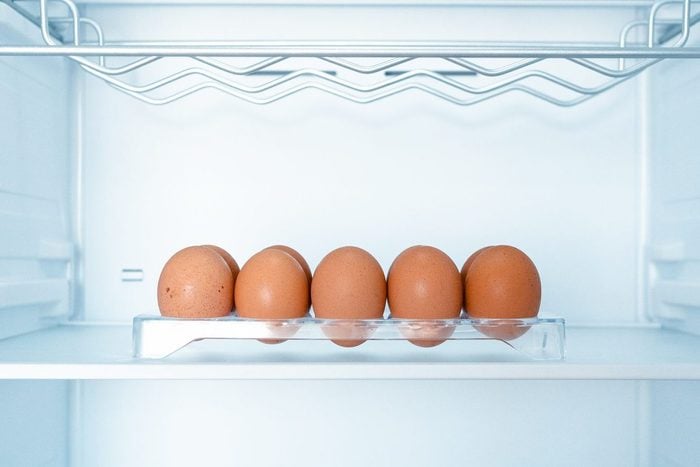Do Eggs Need to Be Refrigerated?
Updated: Feb. 01, 2024

Have you ever wondered whether it's safe to leave eggs on the counter? We've cracked the case.
Like butter, eggs are one of those foods that make us question how necessary it is to keep them cold. Do eggs need to be refrigerated? After all, many recipes call for room-temperature eggs, and if you go to a farm stand, those cartons of freshly laid eggs aren’t always in a cooler. So, is refrigerating eggs all it’s cracked up to be?
Britanny Saunier, executive director of the Partnership for Food Safety Education, says yes—it’s crucial for temperature control. “When foods are left out for longer than two hours, they have the potential to enter what we call the ‘danger zone,'” she says. No matter if they’re white or brown eggs, it’s important to keep them at an optimal temperature. Read on to learn more about the “danger zone,” why you should never store eggs in the refrigerator door, and the right way to remove eggs from the carton. Plus, how can you tell if eggs are still good?
What happens if you don’t refrigerate eggs?
Salmonella is a major risk of consuming unrefrigerated eggs. You’ve probably read that you shouldn’t eat raw cookie dough, or that you should never wash fresh eggs because doing so can increase your risk of getting salmonella—and these aren’t just old wives’ tales. “Between 40 and 140 degrees, bacteria can grow rapidly—that’s what we call the ‘danger zone.’ Most refrigerators are set at 40 degrees or below, and that keeps things safer because it provides a consistent environment and stops bacteria from growing,” says Saunier.
“The most common strain of bacteria associated with eggs is salmonella enteritidis. People think that food-borne illness is just a bad night in the bathroom, but it can have long-term health effects, such as kidney failure,” she said. Or even death; the CDC estimates that 420 people in the United States die every year from salmonella.
How to properly store eggs
Now that we’ve figured out whether or not eggs need to be refrigerated, it’s also important to note that how you do this matters too. According to Jaydee Hanson, policy director for The Center for Food Safety, eggs need to be kept in a refrigerator that’s at least 40 degrees or cooler. “If you’ve kept an egg at the right temperature, it’s not going to kill you,” he says.
No matter cage free vs. free range, Saunier recommends storing eggs in the core of the refrigerator rather than on the door because the “door temperature isn’t as easily controlled as the interior,” and it’s likely warmer in the door. She also recommends keeping the eggs in their carton or a covered container to minimize cross-contamination by other food products. The CDC even advises you wash your hands after handling eggshells, as well as cleaning any surfaces, like countertops, that the eggs come into contact with. Don’t toss the shells into the bin instead use eggshells for plants.
How to avoid getting sick from eggs
Another way to decrease your risk of getting sick from eggs is to cook them until the yolk and whites are firm, says Saunier, who acknowledges that this might make some egg lovers unhappy. For dishes that contain eggs, such as casseroles, the Partnership for Food Safety Education recommends that the internal temperature reach 160 degrees on a food thermometer.
If you prefer your yolks on the runny side or plan to eat food or drinks that contain raw eggs, such as homemade ice cream or certain whiskey sours, err on the side of caution and buy pasteurized eggs, says Hanson. “Pasteurization raises the temperature of an egg enough to kill bacteria without actually cooking the egg,” he explains. Liquid eggs and egg whites are usually pasteurized.
For more egg-cooking tips, be sure to add this secret ingredient for the fluffiest scrambled eggs your breakfast plate has ever seen. Better yet, try something new and add this chef-approved secret ingredient that will take your scrambled eggs to the next level.
What about when recipes call for room-temperature eggs?
Oftentimes, recipes call for room-temperature ingredients for better texture. But how does that fit with the guidance that eggs need to be refrigerated? According to Saunier, it’s safe to leave food out for up to two hours before you have to worry about the dangers of bacteria. “Although if you live in a climate that’s consistently hot and humid and you don’t have air-conditioning, you might want to reduce that to one hour,” she says.
Now that you’ve cracked whether eggs need to be refrigerated, learn the easiest way to peel a hard-boiled egg, and try these easy ways to add flair to your scrambled eggs.
Sources:
- CDC: “Salmonella”
- CDC: “Salmonella and Eggs”
- USDA Food Safety and Inspection Service: “Shell Eggs from Farm to Table”
- Partnership for Food Safety Education: “Egg-stra Care for Spring Celebrations”
- Center for Food Safety



